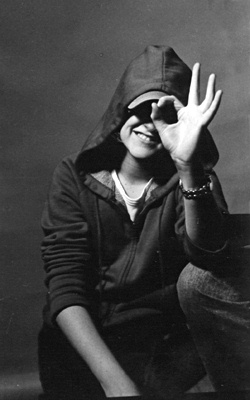All Nonfiction
- Bullying
- Books
- Academic
- Author Interviews
- Celebrity interviews
- College Articles
- College Essays
- Educator of the Year
- Heroes
- Interviews
- Memoir
- Personal Experience
- Sports
- Travel & Culture
All Opinions
- Bullying
- Current Events / Politics
- Discrimination
- Drugs / Alcohol / Smoking
- Entertainment / Celebrities
- Environment
- Love / Relationships
- Movies / Music / TV
- Pop Culture / Trends
- School / College
- Social Issues / Civics
- Spirituality / Religion
- Sports / Hobbies
All Hot Topics
- Bullying
- Community Service
- Environment
- Health
- Letters to the Editor
- Pride & Prejudice
- What Matters
- Back
Summer Guide
- Program Links
- Program Reviews
- Back
College Guide
- College Links
- College Reviews
- College Essays
- College Articles
- Back
Om Mani Padme Hum
Om mani padme hum. I sip my sweetened, roasted, yerba mate from my cuia(gourd) with a customary bomba (filtering straw) and write an email to a friend in Portanol, a blend of Portuguese and Spanish that, while a bad idea to use in the real world, is fun for socializing. Om mani padme hum. I count my Tibetan prayer beads through my hands, one at a time with my right thumb, stopping to utter a special prayer of compassion and self guidance at each of the three small beads. Om mani padme hum. The kettle starts to whimper, so I steep my green tea and sit down with two beverages now from opposite sides of the world and pull up Facebook.
That's a pretty typical evening for me. Before I do my homework, before I eat dinner, I socialize a little, and unwind as it's good for the soul. I am a professed tea drinker. Beyond that, I can't really say I am committed to any one religion. I am a Buddhist, Thelemite, Christian, Taoist, Pagan, Hindu, Occultist practitioner of Shamanism, supporter of Islam, and lover of the Universe. How does that make a tea drinker? Tea is what inspired it all.
It started when I found a green tea I liked. I did some research and found out I was drinking a Japanese sencha. It's a surprisingly natural and simple flavor to come from a country where the hustling, bustling Tokyo stands as a focal point. I then jumped the sea and tried some oolong, a smoky, black tea that Chinese medicine prescribes for the winter just as it prescribes green tea for the summer. Sipping oolong, it wasn't very hard to see the Tao in the snow falling under the Illinois moon, in the steam rising from the mug of amber liquid, in my own misting breath. From oolong I went to darjeelings and assams, Indian grown black teas each with a unique flavor. In India I experimented with chai, a sweet, creamy, spiced sensation reminiscent of the Hindu religion. Dancing Shiva, smiling Ganesha, even the exacting Kali are brewed in the universe under Brahma, so too is chai made with thousands of flavors and ingredients, varied by region, all united in one drink, one word, the tea of the polytheistic monotheist. India brought me to London where I found many a delightful blend of black and flavored teas, including that beloved classic: Earl Gray.
Now I was here for a while until I picked up some red tea, really an herbal infusion of the rooibos plant, and found myself in Africa, where indigenous societies and Shamans still practice in a beautiful and primal environment. I could taste the dancing around a fire, the chanting and then I was in Australia and North America as well, cold earth under my.
White tea was the only flavor that had eluded me, but eventually the delicate nature of the tea became clear to me. Like the taste of a gentle crown, the flavor of meditation under a bodhi tree, and a tonic with such an effect in its subtlety, similar to the beauty of the Savior's faith, rediscovered in the garden of Gethsamane as sacred blood poured from his pores from the profound nature of his prayers.
Tea, black, green, white, red, or herbal started my heart and as it filled my belly and my mouth so too did it plant a seed in me. With every sip of my connection to the sacred, I know I will be met with only more success and I will never stop influencing those around me with tea bags and quotes from canon, to create a culture of universal contentment.

Similar Articles
JOIN THE DISCUSSION
This article has 1 comment.

Lovely piece of writing !
I'd never imagined just how inspiring a humble drink could be... Excellent ! :)
Keep it up..